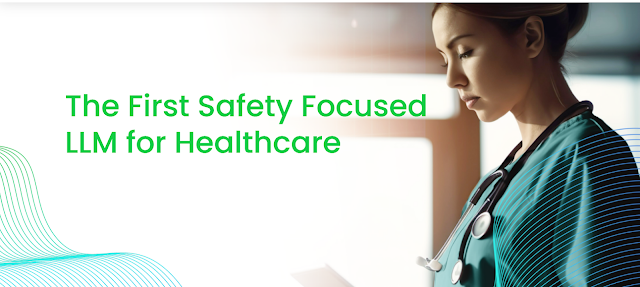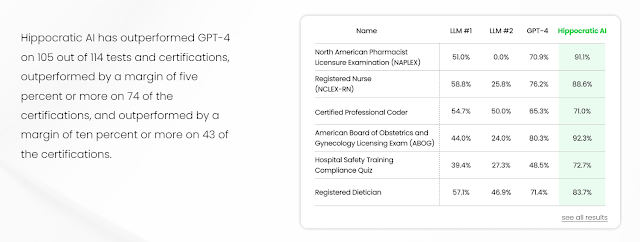Empowering Healthcare with Safe and Ethical AI: Meet Hippocratic AI's Groundbreaking Language Model
Hippocratic AI is a startup that aims to create a large language model (LLM) for healthcare applications. The company, which was founded by a team of physicians, hospital administrators, Medicare professionals and AI researchers, has raised $50 million in seed funding from General Catalyst and Andreessen Horowitz. The funding round is one of the largest for a pre-product AI company and reflects the growing interest in LLMs for specific domains.
LLMs are artificial intelligence systems that can generate natural language texts based on a given input or context. They have been shown to perform well on various natural language processing tasks, such as summarization, translation, question answering and text generation. However, LLMs also pose challenges and risks, especially when applied to sensitive domains like healthcare. For instance, LLMs may produce inaccurate, misleading or harmful information that could affect the health outcomes of patients or the reputation of healthcare providers.
Hippocratic AI claims to have developed the first safety-focused LLM for healthcare, which is designed to avoid such pitfalls and adhere to the ethical principles of medicine. The company says its LLM is trained on large amounts of healthcare data and certified by healthcare professionals on over 100 healthcare exams. The company also says its LLM is tested for its "bedside manner", which means its ability to communicate with patients in a respectful, empathetic and informative way.
The company plans to use its LLM to power various healthcare bots that can interact with patients via voice or text. These bots will focus on non-diagnostic, patient-facing use cases, such as explaining benefits and billing, providing dietary advice and medication reminders, answering pre-op questions, onboarding patients and delivering negative test results. The company says these bots will help fill the gap of healthcare workers and improve the accessibility and quality of care for patients.
Hippocratic AI is not the only company that is exploring the use of LLMs for healthcare. Other examples include Babylon Health, which uses an LLM to provide symptom checking and triage services; Nuance, which uses an LLM to transcribe and document clinical conversations; and Infermedica, which uses an LLM to provide health assessment and triage services. However, Hippocratic AI says its LLM is different from others because it is specifically tailored for healthcare and safety.
The company expects to launch its first product later this year and partner with health systems, insurers and employers. The company also hopes to expand its LLM to other healthcare domains and languages in the future.
Hippocratic believes that the LLM has the potential to revolutionize healthcare. Here are some of the benefits of using a large language model for healthcare:
Enhanced Patient Communication: With a large language model (LLM), healthcare providers can leverage natural language processing to generate patient-friendly explanations, dietary advice, medication reminders, and answer pre-operative questions. This improves patient engagement, understanding, and overall satisfaction with their healthcare experience.
Improved Accessibility: Healthcare bots powered by LLMs can bridge the gap between healthcare workers and patients, especially in non-diagnostic, patient-facing scenarios. By providing 24/7 availability and quick responses, LLM-driven bots enable patients to access healthcare information and support anytime, regardless of geographical or time constraints.
Increased Efficiency: LLMs have the potential to streamline administrative processes by automating tasks related to benefits explanation, billing, and patient onboarding. By offloading these tasks to AI-powered bots, healthcare providers can focus more on direct patient care, reducing administrative burdens and improving overall efficiency.
Personalized Care and Support: LLM-based healthcare bots can deliver tailored responses and recommendations based on individual patient needs. By analyzing vast amounts of healthcare data, LLMs can offer personalized insights, medication reminders, and lifestyle suggestions, facilitating proactive health management and empowering patients to take control of their well-being.
Safety and Ethical Considerations: Hippocratic AI's safety-focused LLM specifically addresses the risks associated with using AI in healthcare. By adhering to ethical principles and undergoing rigorous certification and testing, the LLM aims to provide accurate, reliable, and responsible information, ensuring patient safety and avoiding potential harm or misinformation.
Scalability and Language Adaptability: LLMs have the potential to scale healthcare services globally, as they can be trained in different languages and adapted to specific healthcare domains. This scalability enables broader accessibility to healthcare information and support for diverse populations, breaking language barriers and improving healthcare equity.
Advanced Data Analysis: By leveraging LLMs, healthcare organizations can process and analyze vast amounts of medical literature, research papers, and patient data more efficiently. This can contribute to faster clinical decision-making, evidence-based practices, and improved medical research, ultimately advancing the quality of healthcare delivery.
The founders of Hippocratic are a group of physicians, hospital administrators, Medicare professionals and AI researchers from organizations such as Johns Hopkins, Stanford, Google and Nvidia. The CEO and co-founder of Hippocratic is Munjal Shah, who previously sold his company Like.com, a shopping comparison site, to Google in 2010.
Hippocratic's LLM is not intended to diagnose medical conditions, but rather to provide non-diagnostic, patient-facing services such as explaining benefits and billing, providing dietary advice and medication reminders, answering pre-op questions, onboarding patients and delivering negative test results. The company says that its LLM can outperform leading language models such as GPT-4 and Claude on various healthcare exams, such as the NCLEX-RN for nursing, the American Board of Urology exam and the registered dietitian exam.
Hippocratic's LLM is also trained to have a good "bedside manner", meaning that it can communicate with patients in a respectful, empathetic and informative way. The company plans to partner closely with the healthcare industry to ensure that its LLM adheres to data retention and privacy policies and meets regulatory standards.
Hippocratic's vision is to use its LLM to fill the gap of healthcare workers in the US and to improve healthcare accessibility and outcomes for millions of people. The company believes that generative AI has the potential to transform healthcare and to create a new workforce of healthcare bots. More information about this is available at https://www.hippocraticai.com/
Also read:
Glass Health: Revolutionizing Clinical Decision-Making with AI-Powered Software












No comments: